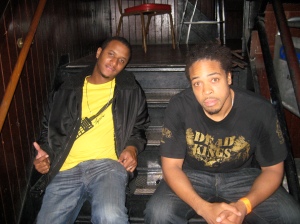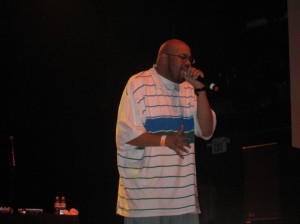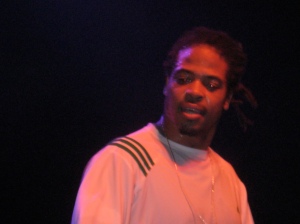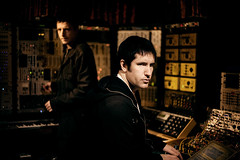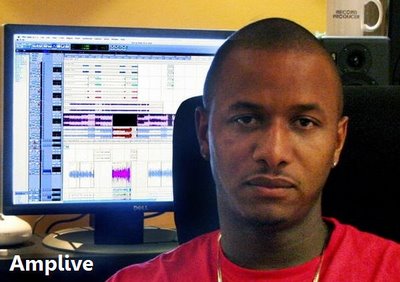From their initial release, 2000‘s Mind Over Matter, to last year’s collaboration album with The Grouch, Heroes in the City of Dope, the Bay Area based duo of MC Zumbi and AmpLive known as Zion I has been making incredible music that incorporates hip-hop, world rhythms, hyphy, electronica and jazz sensibilities with intelligent lyrics looking at economic situations, social situations and meditative introspection. They’ve released an album in Japan (Break A Dawn) and have put out mix tape’s like Curb Servin‘ and remixes in the form of AmpLive’s re-working of Radiohead’s In Rainbows release. After their show at the Grand Ballroom in San Francisco on Saturday night, I got a chance to sit down with these two and ask them about their upcoming album, The Take Over, making hip-hop in the Bay Area and their favorite Zion I song.
AC: How do you determine your setlists?
Amp: For a tour, we practice before we go out, but basically our set lists have been the same the last couple of years and just changes slightly with the albums.
AC: The last album you did with The Grouch, Heroes in the City of Dope, what was it like working on The Take Over with just the two of you again?
Z: It was different because Grouch brings a whole different element, a whole different mind pattern. When we were working on Heroes, I remember sitting down and talking over each song really in depth, cause he’s a real insightful person, so we’d just talk out everything, so by the time the pen hit the paper, everything was already laid out. When it’s just Zion I, we talk about it, but my process is more about figuring it out as I go, like I feel something from the beat, and I have something but I have to remember to stay on topic. Grouch is just focused. Plus, Grouch writes half the verses too, when it’s Zion I, I have to write everything, so in that way it’s different. And I think with the beats, on Zion I stuff Amp is able to just go off more on his own. Zion I is just a more eclectic vibe, so we push a little bit harder and go off in different experimental ways.
AC: As you guys have progressed through your albums from Mind Over Matter to Deep Water Slang and the ones that have followed, what has become easier about making hip-hop for you, and what has become harder for you?
Z: Good question.
Amp: To me it’s never easy, because you don’t know if people are going to like it, and you just want it to be tight. Sometimes it’s hard knowing what to do, honestly, you have the way you feel, but sometimes it’s hard deciding what direction you want to go.
Z: For me, as a writer, it’s easier to know what I feel when I hear music because I’ve been doing it longer now as opposed to in ’95. I’ve been doing it 13 more years now, so I know what I feel. But still, like he said, you can’t get too cocky to the music or the culture, you have to be humble and a fan, you have to stay a fan. You don’t want to get old school, like you’re retro now on purpose, you have to have your ears to the street and just be open to the music. Sometimes it’s easy to get like, “Oh man, we used to do it like that back then and the new cats are doing it like this and that ain’t tight.” But you have to, as a fan of the culture, you have to have an open lingo to everything to stay fresh and relevant.
AC: That brings me to my next question. What are you guys listening to right now?
Z: In the van, we were listening to a lot of Santogold mixtapes, weren’t we? Cats just kept rotating that shit back to back. I listen to a lot of beat tapes recently, I get in my car and I’m looking for music and I’m just feeling the beat tapes. I’ve got some beat tapes from Bedrock, I’ve got this shit called Congotronics it’s club music, from Africa, it’s not even new, it’s kinda old, but it’s just really interesting. It’s hella rhythmic, with this bass sound and they take these calimbos, these thumb pianos and then they hook them up to these amplifiers so it sounds electronic, but it’s really traditional instruments, so I’ve been bumping them a lot.
AC: Zion I, E-40, Hiero are just three names in what makes up the Bay Area’s very rich hip-hop culture, I think in comparison to the rest of the United States. What is it about this scene that you think creates that?
Amp: It’s just such a big place with lots of variety, historically. The music that’s come up here, there’s a fan base that’s implanted here. There’s always a crowd for different types of music. I think there’s big energy.
Z: It’s California. People on the West Coast, we get a lot of ideas, just like the East Coast gets ideas, New York, Atlanta. On the West Coast we get ideas from a different angle, but it’s a place where people are very open to processing different perspectives, in the Bay Area especially. It has to be one of the most diverse places in the country, so I think it’s only right that our music showcases that.
A: What can people expect stylistically from The Take Over?
Amp: It’s all over the place, there’s a lot of different stuff on there. It’s definitely straight to the point in a lot of places.
Z: It’s eclectic, but there’s definitely a boom element, and there’s definitely soul, I think it’s a soulful record. Even though we go in a lot of different directions in the production, I think there’s a link through everything that’s very soulful, whether it’s the content or the singing or the way Amp produced the beat, it’s got heart to it.
AC: How many songs is Mr. Holiday going to be on on the album?
Amp: Codany Holiday. On the album, he’s on two tracks where he’s up front and then he does a lot of background vocals on a lot of stuff. You like Codany?
AC: I do. My exposure to him was through your Rainydayz Remixes.
Amp: You should go on my Myspace and download the Jamie Lidell, he did a Jamie Lidell remix.
AC: Last question here…favorite Zion I song for each of you.
Amp: From The Take Over?
AC: No, whenever. Through all of your albums, there’s a lot of music to choose from. What really stands out for you?
Z: That’s hard man.
Amp: We did a new song called “DJ DJ” that I like a lot. It’s a very DJ ready song that I think is really tight.
Z: Man, that’s really tough. What comes to my mind is either “Silly Putty” or “Innerlight,” because I remember when I wrote “Innerlight” I had just come home from meditating really tough and Amp was playing the beat already, and it just matched my state of mind so perfectly. When I wrote it, it was one of the easiest songs I wrote, ever. It just came off the pen, and it was just so easy, it just felt good. Same with “Silly Putty.”
Amp: It seems like “The Bay” was like that.
Z: Yea, but it’s just captured something different, it’s more inside, “The Bay” is more of an external thing, whereas “Innerlight” and “Silly Putty,” those were internal. “Silly Putty” I just wrote it and when Grouch got it and he just kept with it automatically and he just enhanced it. So probably those two songs because of the way they came about.
For a review of the Zion I show at the Grand Ballroom Saturday night, click here.
